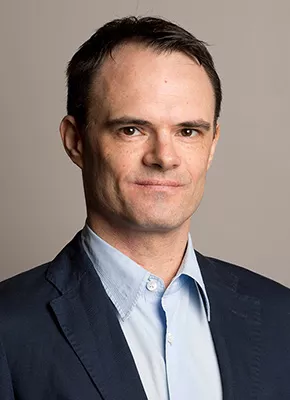Listen: U.S. Exit from Iran Deal Could be "Catastrophic," Says Political Scientist Dominic Tierney

RadioTimes (WHYY): Nuclear decisions
The Atlantic: America Keeps Accidentally Helping Iran
According to Associate Professor of Political Science Dominic Tierney, the United States' exit from the Iran nuclear deal will have serious ramifications for American foreign policy.
"It can drive an absolute wedge between the U.S. and its allies," Tierney said during an appearance on WHYY's RadioTimes prior to President Trump formally announcing an exit from the deal. "If the U.S. wants to re-introduce sanctions, it is not certain that the Europeans will follow suit. This could be catastrophic for the U.S.-Europe alliance and U.S. global order."
Tierney was a guest on the hour-long program along with journalist Bobby Ghosh and later wrote an article in The Atlantic after the announcement. He argues that the decision fits with a patten of American policy unintentionally furthering Iranian interests. For example, he says that U.S. efforts in the Iraq War and the battle against ISIS allowed Iran to strengthen its own position in the Middle East. Tierney says that in the wake of America's exit from the deal, Iran can could seize moral high round by continuing to act in compliance and also benefit from division between America and its allies, which may refuse to comply with further sanctions brought by the U.S.
Along with the Iran deal, Tierney discussed on WHYY Israeli Prime Minister Benjamin Netanyahu's claim that Iran was violating the terms of the nuclear agreement, whether the decision to leave the Iran agreement could affect future negotiations with North Korea, and if President Trump deserves credit for getting North and South Korea to the negotiating table.
In terms of upcoming negotiations with North Korea, Tierney said there are reasons to be cautious and reasons to be hopeful. "Reasons to be cautious include that we have been here [negotiating peace] before, with Presidents Bill Clinton and George W. Bush. They both unraveled," he said. "On the other hand, there are undoubtedly reasons to be optimistic. We saw the first visit of a North Korean leader to South Korea since the Korean War, and North Korea made some pretty strong statements about denuclearization."
Tierney is associate professor of political science, a senior fellow at the Foreign Policy Research Institute, and a contributing writer at The Atlantic. He is an expert in international politics with particular interest in U.S. foreign policy, public opinion and war, and broader international security issues. He completed his Ph.D. in international politics at Oxford University in 2003 and was a post-doctoral fellow at the Mershon Center at Ohio State University and the Olin Institute at Harvard University before joining the Swarthmore faculty in 2005. His latest book is The Right Way to Lose a War: America in an Age of Unwinnable Conflicts (Little, Brown, & Co., 2015).



